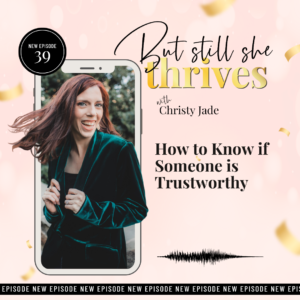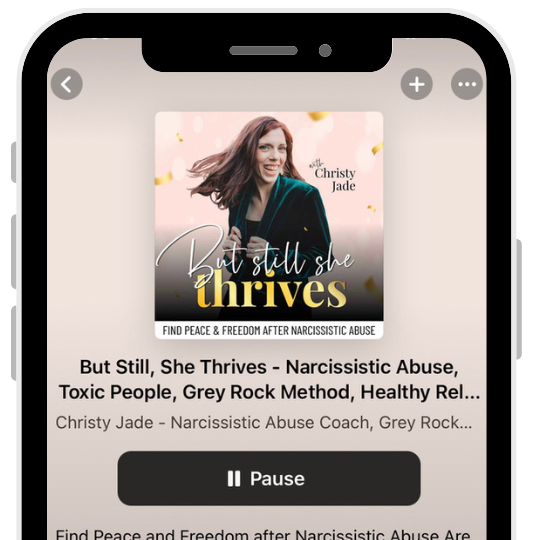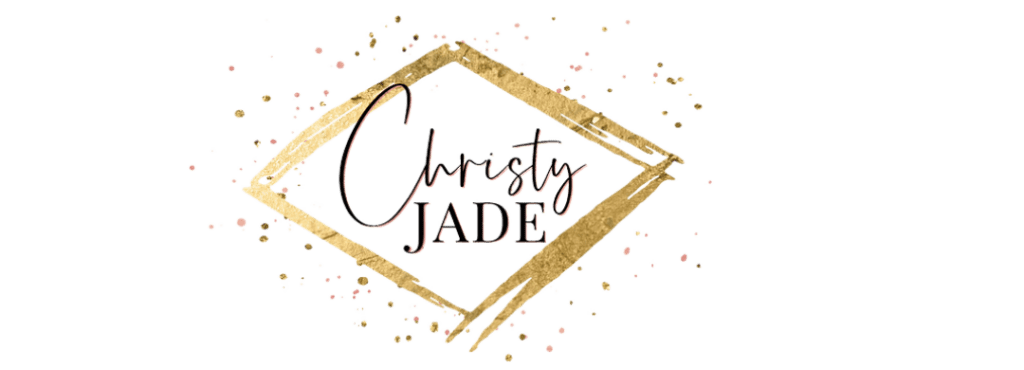How to Know if Someone is Trustworthy
Top 3% in podcasts globally
This week we talk about How to Know if a Person is Trustworthy. This can feel especially hard to those of us who have gone through abuse, but I think you will enjoy these tips!
Grab my setting boundaries E-Course here:
https://christyjade.podia.com/boundariescourse
Wanna work with me 1:1? I have ONE spot left open for June!
https://christyjade.com/transformational-coaching-quarterly/
ARE YOU LOVING MY CONTENT? You can say thanks here:
https://christyjade.ck.page/products/queen-drop
GET ON MY WAITLIST FOR MY UPCOMING COURSE:
https://queensofpeacewaitlist.lpages.co/early-bird-waitlist/
Want to start your day off feeling amazing?!
My EPIC 4 MINUTE empowering meditation is yours, free!
https://christyjade.ck.page/insider
Join my free facebook group here:
https://facebook.com/groups/christyjade
And if you just wanna peek around and find out more about me and my work..check out my website! It’s FUN AND SPARKLY 😉
Want to drop me a line or have a question? Email me anytime!
Let’s connect on social media!
https://www.instagram.com/fiercechristyjade/
https://www.tiktok.com/@fiercemamachristy
After abuse we need SIMPLE. I created a planner for busy women just like you to navigate your days easier: https://christyjade.podia.com/shethrivesplanner
I am Christy Jade, adoring wife, adoptive mama and narcissistic abuse survivor. I now help other women who have gone through abuse (or are going through it) find confidence, power and peace.
DOMESTIC ABUSE HOTLINE : 800-799-7233
Speaker 1: (00:00)
Hello, beautiful beings out there. Put a smile on your face. I want you to be happy today. Let’s decide to be happy. I hope you’re in a good mood. If you’re not, let’s turn it around. All right. Today we are going to talk about how to determine if someone is trustworthy. On the previous episode this week, we talked about trust and regaining trust in ourselves and other people. So I thought I would do a little tip session. Nine tips on how to determine if someone is trustworthy. There are some signs. So let’s dig in.
Speaker 1: (00:37)
Hey, Queens, welcome to, but still she thrives. Do you wanna stop getting caught up in that wicked web of a creepy crawly narcissist? Do you find yourself up late at night replaying the abuse you put up with and wondering how you can heal now? Do you wake up hoping for healthy relationships and peace only to feel totally exhausted and mind effed? Girl, I see you. I’m Christy. I too had to disconnect from toxic people in my life and I wished I could undo the damage. I felt ashamed, lonely, and kind of lost. But I’m a stubborn Italian and I refuse to give up. I found ways to recalibrate my mind and body more quickly than I thought and can now share them with you. In this podcast, you will find coping tools, healing methods, and confidence boosters so you can trust yourself and find peace and freedom. So, shields up ladies, let’s go protect our peace.
Speaker 1: (01:35)
So after narcissistic abuse, it can be tricky trusting yourself to make the good decisions, trusting yourself to be able to tell if someone’s trustworthy, trusting other people. Cause there’s some whack people that hurt our feelings and our souls . So let’s dive into how to know if someone is trustworthy. Number one, honesty. So look for consistent honesty in their words and their actions. I say actions more than words, right? Because there’s a lot of lip service, especially if you have attracted someone of the narcissistic personality and you’re worried about attracting it again, they are good at lip service. So yes, words matter, but actions matter more. So are they transparent? Are they open? Are they truthful in their communication? But it’s kind of like, well, yeah, you asked that, but sometimes like I thought they were honest. Now that you’ve been through it, believe it or not, you actually can tell a little better than the start of your journey with a narcissist because you’re here, you’re away, you’re trying to heal.
Speaker 1: (02:42)
You did see red flags, you did get out or you’re trying to get out. So you know, some of the red flags, you know that intuition feeling. You need to get in touch with your intuition to really be able to feel that. Again, I have some episodes go binge my episodes cuz I talk a lot about that. Meditation y yoga, doing these things really help you, um, kind of connect your intuition back to your mind, your body, your soul. So you can trust yourself intuitively, right? But one way to kind of test this is when you are, let’s say dating or getting a new friendship, whatever. When you ask questions, do they feel like, seem like they’re avoiding them? They don’t want to answer, especially when you’re asking pretty simple questions that have simple answers. Do they get defensive? So kind of read body language, see hesitancy, um, and see how open they are because a lot of narcissists will not answer certain things, especially in the beginning when they’re trying to paint a beautiful, perfect picture of themselves.
Speaker 1: (03:51)
Also, look at that. Are they very arrogant? Are they talking about how great they are? Either way, uh, narcissistic or not, homie, don’t play that. Like I I am not into arrogant people, , it’s just not a great trait. So pay attention to these things as they’re talking, like I said, their, their body, their demeanor. Like are they asking questions about you? Are they remembering them? Does it seem, seem sincere? And you, we’ll start to build this trust. Like I said, if you’ve gone through it, you do have a better idea and you, it might take time. This might not be overnight, but keep listening and watching. Number two, are they reliable? So do they follow through on their commitments? Do they make excuses, which isn’t that cool? Do they cancel all the time? I had one narcissistic relationship, uh, romantic relationship and whew, that guy put me through the ringer with canceling and excuses and all sorts of things.
Speaker 1: (04:51)
Not very dependable. So that was a sign I kind of missed a little bit. So are they dependable, punctual? That’s a good thing. We like that. Can you rely on them to do what they say they will do? Number three is consistency. In the beginning, this may be a little tricky, but they will show themselves slowly but surely narcissist will become inconsistent. Um, often it can take a little bit, so sometimes we have to walk through the mud, but consistency is key. Do they display a consistent pattern of behavior over time or they, they do they change their stance or beliefs? Or if they’re talking to one person, they may say something and then talking to another may say something else. Often narcissists will wear different masks depending who they’re talking to. So if you’re around their friends and they seem like different than when they’re around you or they run into somebody unexpectedly and act off, pay attention to these signs.
Speaker 1: (05:57)
All right, number four, integrity. This is a big one when no one is watching. So sometimes it’s hard because, well, it’s no one’s watching. No. But even when they’re not like out on the public eye, they’re not posting on Facebook, they’re not in a group, you know, all eyes aren’t on them. As you get more comfortable with them, they’d be more themselves around you. And how do they act within the walls of their own home? How do they treat wait staff? How do they treat people? Helping them, you know, like at the grocery store or whatever, checking them out. Notice how they treat others when they’re not like performing. Cuz a lot of narcissists, especially the more outgoing narcissist, will have this big, charismatic kind of fake , um, personality and act a certain way. And then when they’re with people they’re comfortable with or alone, they act differently in a negative way.
Speaker 1: (06:58)
So pay attention to any shifts. It goes back to consistency. But also is it adding up to what they kind of present as their moral or ethical principles, right? Like in the quiet of the night, in the dark, when they’re not on the stage of the world, how do they act and how do they treat people? Trustworthy? People act the same whether they are with themselves, whether with their, you know, of course there’s little changes and just comfort levels, but I’m talking about what they do, right? Like I am who I say I am, right? I’m a giving person. I love to help people. Obviously it’s what I do for a living. But behind closed doors, I also buy people their Starbucks. I pay for people at cvs. I leave little rocks that say cute little things on them, right? Like I do kind of random acts of kindness that nobody knows about.
Speaker 1: (07:51)
I don’t talk about it. I’m talking about it now to make a point. But how do these people act when no one or just those close to them are watching? All right, number five might be one of my biggest, biggest tips here. Paying attention to accountability. So when mistakes or prob problems, problems speaking, problems arise, a trustworthy person will take responsibility, right? I’m not gonna say it’s right away. We’re all human. So if they need a minute or if they get a little defensive, that that’s one thing, right? People are people, but if they don’t own their mistakes, if they don’t take responsibility, admitting their faults, apologizing, making things feel better, if they don’t do that, they’re not trustworthy. So a trustworthy person, and this can show up very early on and it’s a good test to look at. If you have a conflict in the first month or two of a new relationship of any kind, how do they act?
Speaker 1: (08:55)
Do they take accountability? It’s really important. Trustworthy people will take accountability and, you know, try to make it better and not just like put all the blame on you or flip things around or, you know, make it bigger than it is. So that’s something also to pay very close attention to. Number six, confidentiality. So this is something, and again, it might not come out in the very beginning, but a trustworthy individual respects confidentiality, privacy, right? So anything shared with them, you share a secret with them, they’re not gonna blast you. I know with narcissists, I’ve, in my own experience, I’ve told them something and found out that they told other people about it to use it against me later. So that sucks. But that’s something to immediately if that happens, no, that person is not trustworthy. It seems obvious, but sometimes we will make excuses for people, right?
Speaker 1: (10:00)
Or they will make excuses for themselves. There is no excuse to share your secrets or your private matters. So trustworthy people can be trusted to keep sensitive or personal information to themselves and not misuse it. And especially use it against you later because that is definitely something narcissists do. I All right, number seven. Are they empathetic? Uh, most of us know narcissists do not have a true empathetic bone in their body. The trick is sometimes they can fake it a little bit, but really long term they cannot. So trustworthy individuals, they show empathy and concern for others, right? Something’s going on, they pay attention. Oh, is that person okay? And you can tell it’s sincere. They’re thinking outside themselves. A lot of times. I mean, there’s empaths like me who think outside of ourselves almost too much. Let me be honest. , sometimes I’m like save a little more for myself, but I’m always thinking about how other people feel and I wanna make sure everyone’s okay.
Speaker 1: (11:05)
Stuff like that. But narcissists really genuinely don’t care that deeply about other people unless it benefits them or, and they might fake it to get you to give them what they want, right? In certain situations. But you’ll be able to tell, it will come out. And again, it’s being able to stop and really analyze and be in touch with your body. Like something doesn’t feel right about this, something doesn’t feel authentic. Sometimes we like kind of dismiss those little red flags and we’d need not to. So trustworthy people demonstrate genuine care and they consider the impact of their actions on others. Where you might hear a narcissist say something like, yeah, whatever, I don’t care. I don’t care what she thinks, I don’t care, right? Like, tough guy over there, I’m so cool and I don’t give a. Well, that’s cool, except we don’t need those people in our lives.
Speaker 1: (12:01)
We want people who care about others. I mean, it seems simple, but here we are. Here we are, , we’ve been on this path, I’ve been down it. So I know you may be going through this and these are things to look out for. Yikes. Here’s a big one. This reminds me of if you’re watching, if you watched Vanderpump Rules this season, and there’s Tom and Arianna, their whole fiasco, and I was kind of like, are we really surprised? Because if you don’t know the story, this dude cheated on his girlfriend and everyone made this huge deal of it and it was a huge deal, but I was kind of like, I mean, it’s almost as if, as if his track record is clean. So the next one, eight is trustworthiness and past experience. So look at their track record in previous situations. If you know them.
Speaker 1: (12:52)
Have they demonstrated trustworthiness? It could, that could be relationships work. Like is there a history? You know, but you’re excusing away like, oh, that wouldn’t happen with me. So basically this dude, Tom had cheated apparently with his current girlfriend now ex but on the show it was his current girlfriend Arianna. And he had apparently also cheated during the relationship earlier. And now he ends up cheating on her with one of her best friends. I wasn’t that surprised. Um, he seems like he has a little track record. So sometimes we forget track records. Let’s not forget track records. So trustworthy people, they have good track records and sometimes we don’t know all people’s track records and secrets, but if you know something in someone’s past, for me that’s, that’s just always been a no-brainer. I’ve never dated someone who openly told me they had cheated or, you know, done something in the past.
Speaker 1: (13:54)
I haven’t, I wouldn’t put myself in that situation and not dogging it, but just saying, let’s do better for ourselves. Let’s not set ourself up like for that. Let’s set ourself up for success with people who don’t have that track record. Eh, they’re out there. Number nine, you can get feedback from others. If you have mutual friends, anybody you know, you know, it’s good to say, Hey, have you heard anything about this dude? You know, how is this a good guy? Is this a nice girl? It, it can’t hurt to talk to people who have had experiences with the person you are quote evaluating. So their perspectives and observations can provide valuable in insight. It doesn’t necessarily mean you have to take their word as gospel, but if you talk to a couple different people and they’re both like, that guy’s kind of a slime ball, well maybe that’s a little jingle jangle in your old warning section of the brain.
Speaker 1: (14:52)
Now remember, trust is not a binary quality. It is on a, a big old spectrum, right? So it’s essential to assess someone’s trustworthiness over time and in various contexts before, you know, deciding yay or nay. But it’s important to pay attention early on and also know that early on, some people, especially narcissists, will put their fake best face forward. So this is why it can be tough and why you can get sucked in. So I get the nervousness of trusting again, but it’s something we have to do. And you, like I said, you’re gonna be better at it than you think because you’ve been through what you’ve been through each time will get a little easier and you’ll know some of the red flags. I mean, if you’re working with me, you’ll definitely know cuz you’ll talk to me and I will tell you, I can sniff these mofos, uh, miles and miles away.
Speaker 1: (15:49)
Now, um, joking aside, kind of joking, not joking, but that aside also really writing down, you know, things that happened in your previous relationship that you were like, this doesn’t seem right, but you ignored. Write that down. When you write something down, it helps just kind of solidify it for me at least. Um, solidify it and make it louder in your brain of like, this is something I need to pay attention to in the future. So writing stuff down definitely helps. And then you could write down what you do want in a person. I want someone who’s transparent, who will answer all my questions. I want someone who doesn’t cancel on me all the time, whatever it is. So what in the past happened that was a red flag that you kind of dismissed? And what do you want and feels good to you now that you’re gonna look for in your future relationships?
Speaker 1: (16:44)
So that’s your homework class dismissed. All right, see you in the next, in the next episode. And if you wanna work one-on-one with me, I will have my link in the show notes. I have a boundaries course in the show notes. I have freebies, like a meditation. I have a new, um, 30 day toxic relationship declutter guide. That is epic. So that’s like if you’re out of a relationship, how to really like de detox your mind, body, and soul from it. It’s so good, so good. So go check that out. And there’s a Facebook free, like a private Facebook group that I have. I’ve got my podcast obviously. So go check out all the show notes, all the things, go have fun and sparkle. Let’s do a little affirmation before we go. Okay? Get ready for it. Hands on heart, unless you’re driving. All right. I am ready to trust. I am worthy of a healthy relationship. I trust myself cause I’m a queen. Good job, you guys rock. All right, loves you Smooches on doses.



